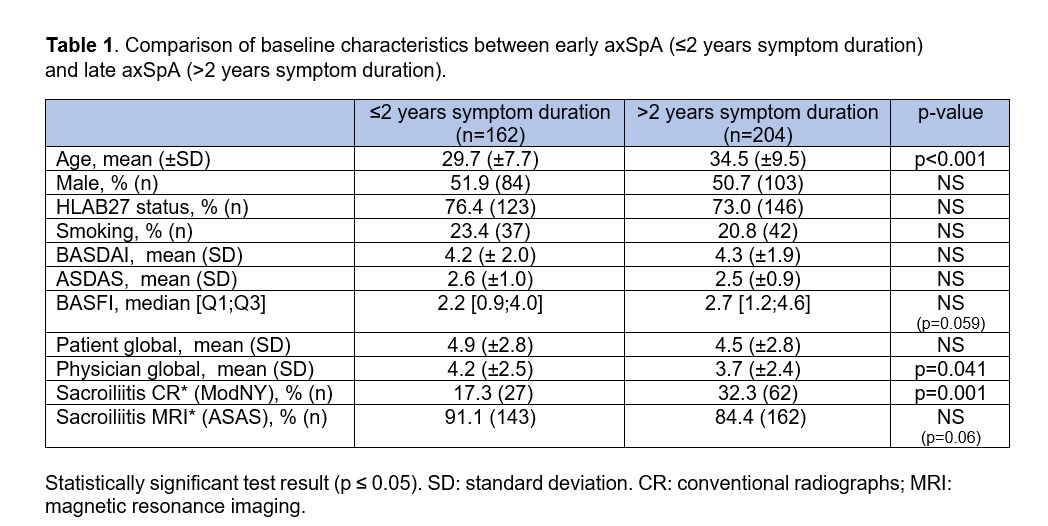Session Information
Session Type: Poster Session B
Session Time: 9:00AM-11:00AM
Background/Purpose: Recently, the Assessment of SpondyloArthritis international Society (ASAS) community, led by the ASAS-SPEAR (SPondyloarthritis EARly definition) working group, endorsed a uniform definition for early axial spondyloarthritis (axSpA). Therefore, in a research setting “early axSpA” should be defined as ≤2 years duration of axial symptoms. The objective was to explore the prevalence of early axSpA as defined by the ASAS community in the prospective Be-GIANT cohort. Additionally, differences in the baseline characteristics of early and late axSpA were analyzed.
Methods: An explorative analysis of all axSpA patients from the prospective Be-GIANT cohort consisting of newly diagnosed adult SpA patients fulfilling the ASAS criteria for axial or peripheral SpA, was performed. Patients were divided in ‘early’ and ‘late’ axSpA based on the proposed ASAS definition. Differences in baseline characteristics between these groups were explored by using the (non) parametric independent- samples T test for continuous variables, and the Chi-square test for categorical variables.
Results: Collected patient data from the Be-GIANT cohort between November 2010 to November 2022 were considered, of which 366 patients with a clinical diagnosis of axial spondyloarthritis and data on symptom duration of axial disease were selected. Overall, 51.2% of patients were male, with mean age of 32.4 ± 9.1 years (mean ± SD). Median axial symptom duration was 30.0 months [10.0; 85.0] (median [Q1;Q3]). HLA-B27 status was positive in 74.5%, with elevated CRP in 41.7% of patients. At baseline, patients exhibited high active disease as indicated by ASDAS 2.5 ± 0.9 (mean ± SD). Strikingly, the definition of early axSpA was met by 44.3% of patients. Regarding imaging, 87,4% fulfilled the ASAS definition of a positive MRI of the sacroiliac joints, whereas 25.6% fulfilled the modified New York criteria for sacroiliitis. When comparing baseline characteristics (Table 1), no significant differences were seen between ‘early’ and ‘late’ axSpA regarding BASDAI, ASDAS, patient global or baseline CRP. Likewise, a similar proportion of family history, good response to NSAIDs or previous infection was seen. As expected, patients in the early axSpA group were significantly younger (p< 0.001), with significantly less radiographic sacroiliitis (p=0.001). Also, physician global was higher in early axSpA as compared to late axSpA (p=0.041). No differences were seen in distribution of sex, HLAB-27 status, nor inflammatory back pain features. A trend was seen in favour of insidious onset of back pain (p=0.051), lower BASFI (p= 0.059) and higher MRI positivity (p=0.06) in the early axSpA group.
Conclusion: In the prospective Be-GIANT cohort, almost half of patients met the definition of ‘early axSpA’. These patients did not differ in baseline characteristics, except for younger age and lower frequency of radiographic sacroiliitis. Although the disease activity scores at baseline were similar, physicians consider the early disease to be more severe.
To cite this abstract in AMA style:
Varkas G, De Craemer A, Lukasik Z, Renson T, Deroo L, Carron P, Elewaut D, Van den Bosch F. Prevalence of Early Axial Spondyloarthritis in the Be-GIANT Cohort Based on the ASAS Consensus Definition of Early Axial Spondyloarthritis [abstract]. Arthritis Rheumatol. 2023; 75 (suppl 9). https://acrabstracts.org/abstract/prevalence-of-early-axial-spondyloarthritis-in-the-be-giant-cohort-based-on-the-asas-consensus-definition-of-early-axial-spondyloarthritis/. Accessed .« Back to ACR Convergence 2023
ACR Meeting Abstracts - https://acrabstracts.org/abstract/prevalence-of-early-axial-spondyloarthritis-in-the-be-giant-cohort-based-on-the-asas-consensus-definition-of-early-axial-spondyloarthritis/

